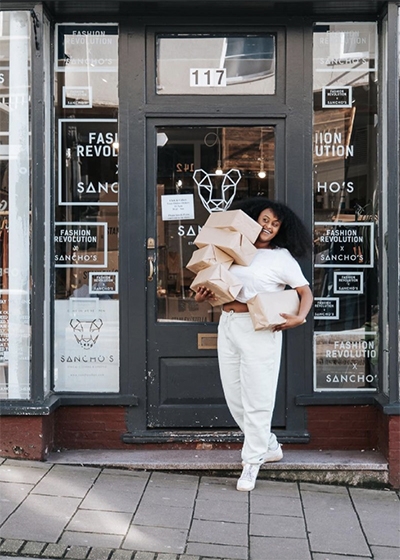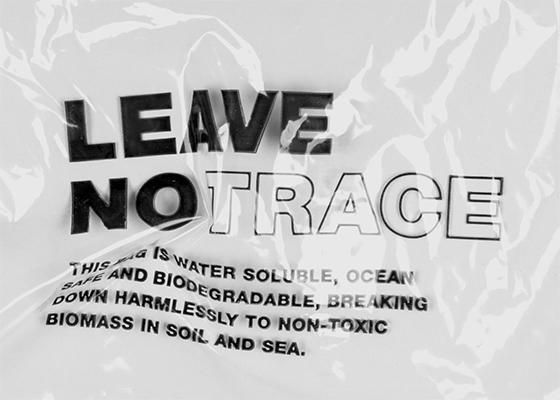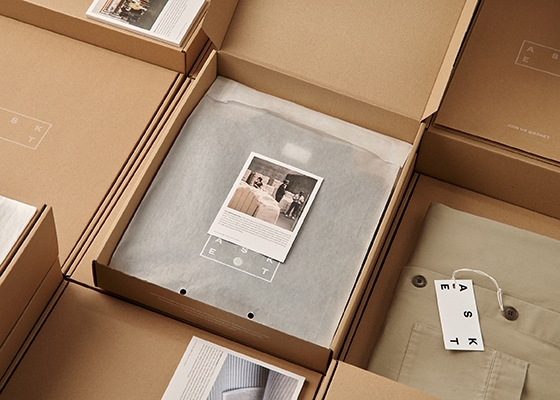Is Your Online Shopping Costing The Earth?
Image: ASKET
Have you ever considered the environmental impact of your online shopping habit? We meet the brands who are innovating and questioning the future of ecommerce.
What can be more satisfying than finding the perfect item online? In a few clicks you can purchase it, and in some cases receive it that very evening. For this reason online shopping is quite addictive, but at what cost? The problem with online shopping, from the delivery of your purchase to its packaging, is its environmental impact. According to menswear label ASKET, a recent report found that global parcel volumes surpassed 100 billion for the first time in 2019¹. That’s equivalent to 3000 parcels shipped every second. And there’s no signs of this issue abating. The same report predicts that parcel volumes are likely to double and reach 220 – 262 billion parcels by 2026. This flood of packaging is a significant source of waste, with landfill sites swelling around the world. In the US, 30% of municipal solid waste is attributed to discarded packaging and containers² – with similar statistics worldwide.

Image: ASOS Plastic Mailer Bags
Increased Deliveries Equal Increased Packaging
While online retail is not responsible for all of this trash, the rise of e-commerce thanks to lockdowns, has contributed to an increase in packaging production and waste. As reported by money.co.uk, just 1 in 10 shoppers considers the environmental impact of deliveries of their online purchases. According to the Dirty Delivery Report, our “eagerness for getting something delivered quickly”, whether that’s via Amazon Prime or next day premier delivery on ASOS, all adds to our online shopping carbon footprint. One in three (35%) of consumers opt for next day delivery when making a purchase online which can be the least carbon-efficient. And let’s be honest, this speed is usually not necessary.
Black Friday is a case study itself on the dangers of mindless online shopping. Last year, the personal finance experts at money.co.uk investigated how much CO2 could be produced by the millions of packages delivered across the country by the top 5 delivery companies. Hermes was predicted to produce the most carbon emissions on Black Friday, with 58,313 tonnes of carbon to be emitted by delivering Black Friday purchases to households across the UK. With a total of 429,000 tonnes of carbon emissions released into the atmosphere. And that’s before we even consider the impact of the millions of items that will also be returned!
How Small Retailers Tackle Ecommerce
Kalkidan Legesse, Co Founder of Sanchos is reconsidering how eCommerce shopping impacts our environment. Sanchos was traditionally a bricks and mortar store based in Exeter, like many, they noticed a rise in online sales post lockdown. The company is now mainly doing business online thanks to the pandemic. Their business wouldn’t exist without an eCommerce platform. Choosing the right packaging to fulfill orders was crucial but also an extremely tricky choice to make. Kalkidan confided, “It’s a minefield really”. They don’t want to use plastic because it’s not eco friendly and don’t want to offer compostable options either because they are expensive and they often require specific conditions not available to all their customers. Sanchos were keen on a recycled option, one that was also recyclable and so opted for cardboard made from 75% recycled card.
According to Kalkidan, excepting that customers will keep and reuse all of the packaging from orders is not realistic. However in the UK – where the majority of their customers reside – cardboard is widely and easily recycled. The big question is, how much does responsible packaging cost a business like this? At Sanchos they did the calculations, and it costs £30,000 a year more for them to use recycled cardboard and paper packaging than poly (plastic mailer) bags. That’s the equivalent of a yearly wage or a new website! “Often businesses are rewarded for choosing models that take cost from themselves but add it to customers or the planet and environment,” Kalkidan explains. “These businesses come across as successful but they have done it at the detriment of the environment and people.” It’s an extra burden to run a sustainable business for these reasons. “Too many environmental issues are put on the shoulders of individuals with the hope they’ll do the right thing, that’s why we need collective solutions.”

Image: Boohoo
Who Absorbs The Cost Of Eco Friendly Packaging?
Kalkidan, an economics student, wanted to ask people on Instagram what they thought of this. Should customers absorb the cost or should businesses? Interestingly, people she spoke to thought that consumers should pay. But what if they aren’t in the position to, and if competitors (like fast fashion retailer Boohoo) aren’t doing the same things, where does that put a small business? Kalkidan believes that one of the initiatives that could boost innovation in packaging should be in supporting startups to make more responsible decisions. Along with making companies that sell single-use packaging pay an extra tax to make the option less attractive. We bet that faced with an additional tax bill, the Boohoo’s of this world will be keen to find a more environmentally sound way to operate!
Overhauling How We Think Of Packaging
Swedish menswear startup ASKET published a White Paper that shares how it redesigned all its packaging to dramatically reduce its environmental impact. “When it comes to reducing your environmental impact, nothing is straightforward,” explains Estelle Nordin, Operations Manager at ASKET and project lead on the packaging overhaul. ASKET has reduced its total material input by 22% and cut packaging related CO2 emissions by 47%. They have done this by eliminating plastic poly bags in their entirety and switching to 100% recycled paper mailers and cardboard boxes. The result is minimalist packaging, choosing 100% recycled paper mailers and boxes as well as glassine paper bags from FSC certified suppliers.
The design of the packaging was key. The team had to strike a careful balance between reducing material input yet still protecting the garment. In a time where e-commerce is on the rise, ASKET hopes that in publishing the White Paper, they can inspire other companies to act quickly and collectively make a meaningful dent in the growing packaging issue.
Innovating Away From Plastic
One of the most innovative materials to be implemented in commercial packaging has to be PVOH. Pioneering outdoor apparel brand Finisterre partnered with Aquapak, introducing the ‘Leave No Trace’ packaging in October 2019. It’s water-soluble, recyclable and biodegradable. The bags break down harmlessly into non-toxic biomass in soil and sea, should it escape into the environment. With this innovation, Finisterre have the power to eliminate the final piece of single-use, non-degradable plastic from their packaging.
The ‘Leave No Trace’ bags are made from a specially formulated polymer resin using Polyvinylalcohol (PVOH). PVOH is still a polymer, but the major differentiator from traditional plastics is that the material is hydrophilic (i.e. it loves water). This means it breaks down quickly in the marine environment without attracting other toxins or forming microplastics, as traditional polymers would. It has been thoroughly tested and found to be non-toxic to marine species. If a turtle were to accidentally eat a ‘Leave No Trace’ bag, the mechanism of breakdown would also decrease the possibility of the turtle accumulating levels which would be harmful, unlike most conventional plastics.
We know that when it comes to the environmental impact of deliveries, there’s no such thing as perfection. We should take into consideration, as customers, that responsible packaging isn’t something that brands owe to us. It costs money and the cheaper options are usually the most environmentally problematic. Not only should you shop from companies like Sancho’s, ASKET or Finisterre, brands clearly demonstrating responsibility in the area of e-commerce packaging. But we should also be buying less online too. This will have a direct impact on the amount of carbon emissions created as well as a reduction in unnecessary packaging.
by Ceci Mezzi
Did This Put A Smile On Your Face? Why Not Subscribe?
If you enjoyed this then theres plenty more on our email newsletters that you'll love. Whether you're a sustainable newbie or an eco conscious pro, our bi monthly emails will inspire you to live sustainably and ethically.
- Pitney Bowes – Parcel Shipping Index key findings: https://www.businesswire.com/news/home/20201012005150/en/Pitney-Bowes-Parcel-Shipping-Index-Reports-Continued-Growth-as-Global-Parcel-Volume-Exceeds-100-billion-for-First-Time-Ever
- Frontier Group – Trash in America: Moving From Destructive Consumption to a Zero-Waste System: https://frontiergroup.org/reports/fg/trash-america
Disclaimer: The people and models in the images featured are not associated with The Vendeur and do not endorse it or the products shown. This post may contain affiliate links. Prices correct at time of publishing.








Trackbacks/Pingbacks